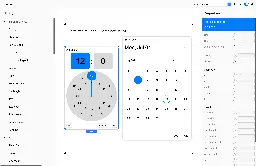Slint 1.14 Released
 Tobias Hunger @ hunger @programming.dev Posts 5Comments 109Joined 2 yr. ago
Tobias Hunger @ hunger @programming.dev Posts 5Comments 109Joined 2 yr. ago

Tobias Hunger @ hunger @programming.dev
Posts
5
Comments
109
Joined
2 yr. ago
Deleted
Permanently Deleted
Slint 1.7 Released with New Widgets, Multi-Window Support, and Live-Preview Redesign
Slint 1.7 Released with New Widgets, Multi-Window Support, and Live-Preview Redesign
Slint 1.7 Released with New Widgets, Multi-Window Support, and Live-Preview Redesign




I revolve very much around copyleft and its ideology. Free software formed my entire career, just as it did for the founders of Slint. From my point of view slint is GPL and offers some other license options for users that do not want GPL for whatever reason.
Forking slint is just as easy as forking any other GPL licensed project: Take all off slints code under GPL and you are done. Yes, you can not relicense that fork to a more permissive license without replacing all the code that you did not write... but that is exactly the same as with any other GPL project you fork. Any use of Slint under GPL is exactly as using any other GPL project, with the same obligations and protections to all parties involved.
I get that you are feeling slint is not GPL, but I do not understand where that feeling comes from. Is it "just" because there is a company backing it? Or because that company is selling their product in addition to oing it under GPL? That is fine for the GNU project from all I understand. Or is it because of contributions happen under MIT terms? But that does not effect the end users that the GPL is protecting in any way.